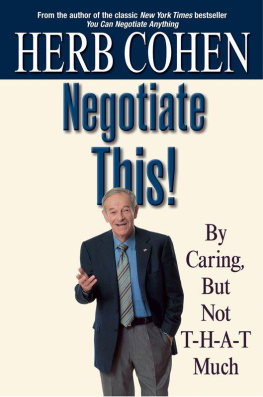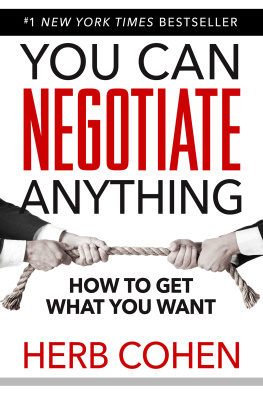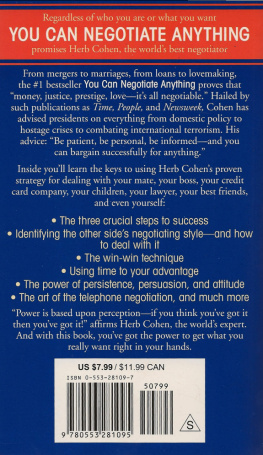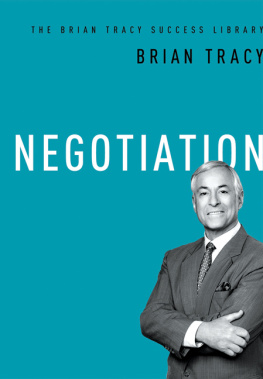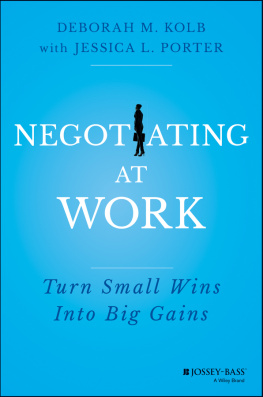This publication is designed to provide competent and reliable information regarding the subject matter covered. However, it is sold with the understanding that the author and publisher are not engaged in rendering legal or other professional advice. Laws and practices often vary from state to state and if expert assistance is required, the services of a professional should be sought. The author and publisher specifically disclaim any liability that is incurred from the use or application of the contents of this book.
Copyright 2003 by Herb Cohen
All rights reserved.
Hachette Book Group, USA
237 Park Avenue, New York, NY 10017
Visit our Web site at www.HachetteBookGroupUSA.com.
First eBook Edition: September 2003
ISBN: 978-0-446-53478-9
CONTENTS
You Can Negotiate Anything
FOR MY BESHEERT,
who helped me understand
that he who laughslasts!
There is no present or futureonly the past, happening over and over againnow.
EUGENE ONEILL
This book has been incubating in me for some time. To be sure, if you believe in the academic axiom publish or perish I would be long dead.
Since You Can Negotiate Anything appeared in 1980, hundreds of publications have been devoted to this subject to the point where negotiation is now virtually regarded as the new mantra or the nimbus of salvation. This flourishing body of knowledge has, for the most part, carried the subject beyond timeworn tales, aged anecdotes, impromptu insights, and gut feelings. Thus, this work attempts to integrate some of these available insights along with my own personal experiences in a form that I trust you will find both entertaining and eminently readable.
What is different about this book? To begin with, it is written in my own unique and recognizable style: the distinct manner I have used to communicate with almost one million people in speeches, lectures, and seminars over the years. Mistakenly or misguidedly, I have once again deliberately tried to be myself.
Next, the distinctive quality of this work is not primarily derived from the discovery, invention, or revelation of new things. Instead, by using allegorical stories, metaphors, and simple models I have tried to get you the reader to view your own experience, behavior, and relationships in a different light.
Lastly, as you proceed I hope you will be smiling and amused by the examples and illustrations. Humor, of course, is no laughing matter. If nothing else, it is a tranquilizer without side effects. But more, if used well it can deepen your understanding, so that you are better able to appreciate yourself as a subject interacting with others in a changing chaotic world.
Many of the ideas and concepts set forth in the pages that follow took their earliest form in 1963 during a three-week negotiating course that I developed and conducted for claims adjusters and attorneys under the auspices of Allstate Insurance Company. It was back then that I used the expressions win-lose and win-win. Since that time, however, I have been personally involved in thousands of negotiations, having benefited immensely from exposure to many thinkers and doers in the field. Moreover, while formally educated in history, international relations, and law, I have spent endless hours in my formative years reading about various means of strategic interaction, in such diverse fields as game theory and social psychology.
In the same manner, for decades I have been an inveterate reader of Time, Newsweek, Commentary, The New Republic, The Nation, and preeminently The Economist, which has greatly affected my thinking and outlook.
Accordingly, this volume, like any other, though signed by one person, carries the presence of many. We are in the world, playwright Arthur Miller once wrote, but the world is also within us. As a result, I have come to believe that what is often represented as total originality is frequently the unconscious forgetting of ones sources. For what is recollection, if not the manipulation of memories?
Having said this, I would be remiss if I did not mention some of the individuals who contributed to my growth and development. Special thanks go to Eugene Emerson Jennings of Michigan State University, a thinker who was always ahead of his time. Also, I owe a debt of gratitude to Saul D. Alinsky, Hannah Arendt, Maureen Berman, Harlan Cleveland, Norman Cousins, Robert Dahl, Morton Deutsch, Viktor Frankl, Jay Haley, Eric Hoffer, Fred Ikl, George Kennan, Henry Kissinger, Morrie Leibman, David Mamet, Marya Mannes, Hans Morgenthau, George Odiorne, Dean Pruitt, Anatole Rapaport, Edward Rowny, Bertrand Russell, Tom Schelling, and I. Willliam Zartman.
To others who left their imprint on my life and so on these pages, I extend my appreciationparticularly Al Carzoli, Harry Chapin, Wes Cornish, Ralph Coppeto, Henry Drewes, Tammy Haddad, Ruzka Korczak-Marle, Vitka and Abba Kovner, and Walt Sirene and Ed Tully of the FBI. I am especially beholden to Larry King for his dedication to bringing this project to fruition. As he often said, In view of the popularity of You Can Negotiate Anything you have a ready-made audience for this book. Then came the caveat: However, in view of the time lag, half of them are already dead.
Likewise, this work comes to you because of the help I received from Julie McCarron, Paul McLaughlin, Deborah Raffin, and especially, Ed Victor. Above all, I am grateful to my editor, Rick Wolff, a person of infinite patience and understanding, and the encouragement and assistance I received from my agent, Michael Viner.
Also, I have the gift of friendship from so many over the years: Betty and Forrest Belcher, Alice Ginott and Ted Cohn, Matilda and Mario Cuomo, Asher Dann, Ellie and David Drachman, Robin and Sol Gittleman, Ted Greenberg, Barbara and Jerry Greenbaum, Joan and Jeff McGrath, Janine and Jon Miller, Susan and Maxwell Soll, Sid Young, and the very special Judy and Stan Sporkin.
More personally, I am thankful to have had a supportive family:
My parents, Esther and Morris Cohen, who taught me by example that one should not try to be a success but rather a person of value. Verily, one is considered successful who takes more out of life than he gives. But a man of value will contribute more than he receives.
My sister, Renee Blumenthal, the family intellectual, who upon reading my first book remarked, It was written for the agesbetween ten and twelve.
Our children, Sharon, Steven, and Rich, and eventually, Bill Levin, Lisa Melmed, and Jessica Medoff, who have enriched our lives.
Most of all, I wish to thank my partner, adviser, and now and then critic, Ellen, for over four decades of encouragement.
Let us turn now to some administrivia before proceeding further. For one thing, in writing this book I was confronted with what I consider the bias or limitations of the English language: the question of pronoun usage. Finding pronouns and principles an uneasy mix, I decided in favor of clarity and simplicity, trusting that the majority of readers would understand that no slight is intended. For another, to make this offering readily readable for the public at large, I have chosen not to furnish potentially disconcerting footnotes. For those who wish to view this subject from other perspectives, I have provided an extensive bibliography.
Finally, I believe my manner of expression is somewhat impressionistic, in that I tend to suggest rather than state. As it is, Im more comfortable describing, rather than prescribing, behavior. The problem with general prescriptions is that each of you is a special case. You have your own separate and unique destiny to fulfill. And the road toward fulfillment lies in questioning everything, including what others tell us, and even what we think we know. The person in charge of you is... you.
Next page
